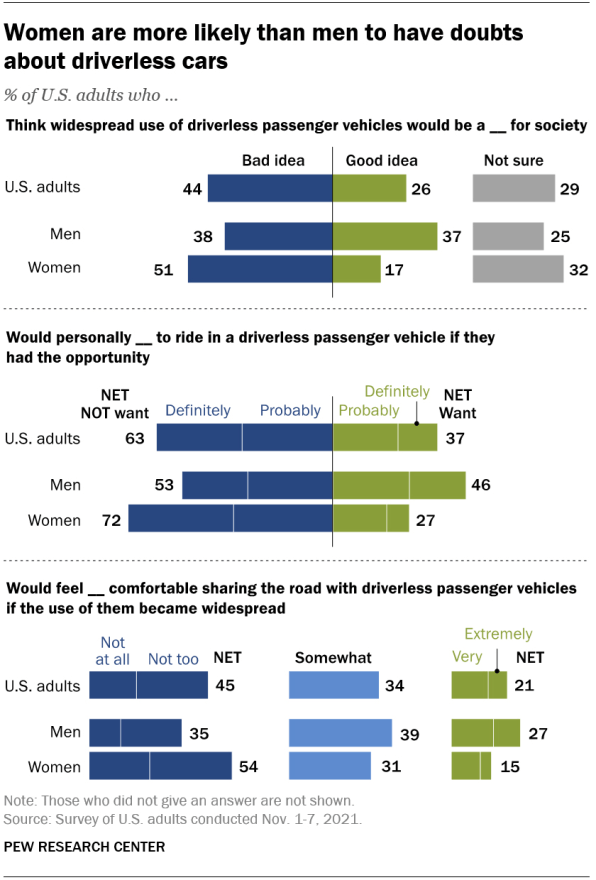- | 10:00 am
Women are far more skeptical of autonomous cars’ safety, according to a new Pew report
Only 3 in 10 women think self-driving cars will reduce traffic accidents and fatalities, according to a new analysis.

A new report by Pew Research Center Wednesday finds that women are far more skeptical than men that self-driving cars will make our roads and highways safer. The findings suggest a public relations problem that could further slow the emergence of automated vehicles, despite the fact that studies have shown that such vehicles would improve safety.
The survey results, which were released on Wednesday, represent a new analysis of a larger November 2021 survey focused on AI and human enhancement issues. Among the survey’s major findings:
- Only about 3 in 10 women say they believe self-driving cars will decrease the number of people killed or injured in accidents. Meanwhile, almost half of men (49%) say automated driving will reduce accidents.
- Just 17% of women say driverless cars are a good idea for society, while 37% of men say the same.
- Only 27% of women surveyed say they would definitely or probably personally want to ride in a driverless passenger vehicle if given the chance, compared with almost half of men (46%).
- A majority of women (54%) say they would not feel comfortable sharing the road with a driverless passenger vehicle if their use becomes widespread. Only 35% of men say the same.
- While self-driving long-haul trucks may be among the first autonomous vehicles to show up on U.S. roadways, both women and men oppose this use of the technology in high numbers. Two-thirds of women (66%) oppose self-driving trucks compared to 53% of men.
- Just over half of women, 51%, say they are against the use of self-driving buses for public transportation. Just over a third of men, or 35%, say the same.
- Women are far more accepting of self-driving vehicles used as taxis, shared-ride vehicles, and delivery trucks, however. Only 39% of women surveyed opposed these applications, while 29% of men opposed them.
The National Highway Traffic Safety Administration (NHTSA) estimates that 42,915 people in the U.S. died in motor vehicle traffic crashes in 2021. Meanwhile, numerous studies have shown that autonomous vehicles, which don’t drive drunk or distracted, have the potential to reduce the number of yearly road fatalities in the U.S. The NHTSA, for its part, suggested in its 2021 report that self-driving cars could “greatly support drivers and reduce human errors and the resulting crashes, injuries, and economic tolls.”

However, research has also shown that automated driving can’t eliminate all auto crashes. One recent study predicts that automated-driving features would cause people to spend even more time in their cars, increasing the likelihood of an accident. Of course, automated vehicles don’t yet fill the roadways, so studies that predict the safety benefits of self-driving vehicles, while very likely correct, have not been proven.
The doubt about the technology revealed in Pew’s research, especially among women, may only be eased when people get more real-life experience safely riding in, or driving near, autonomous vehicles.

































